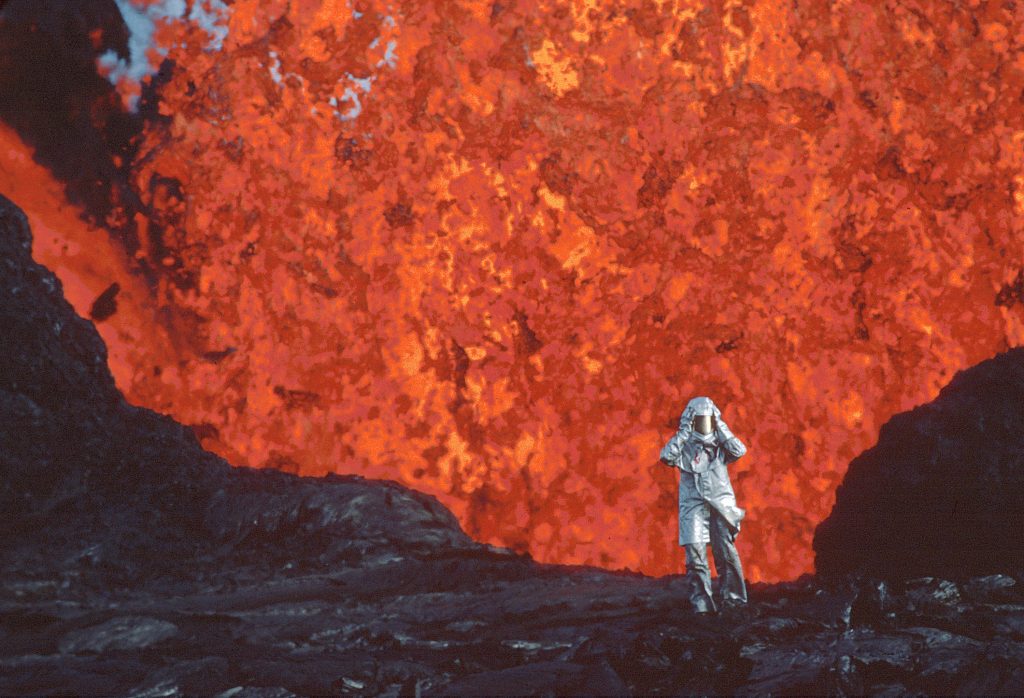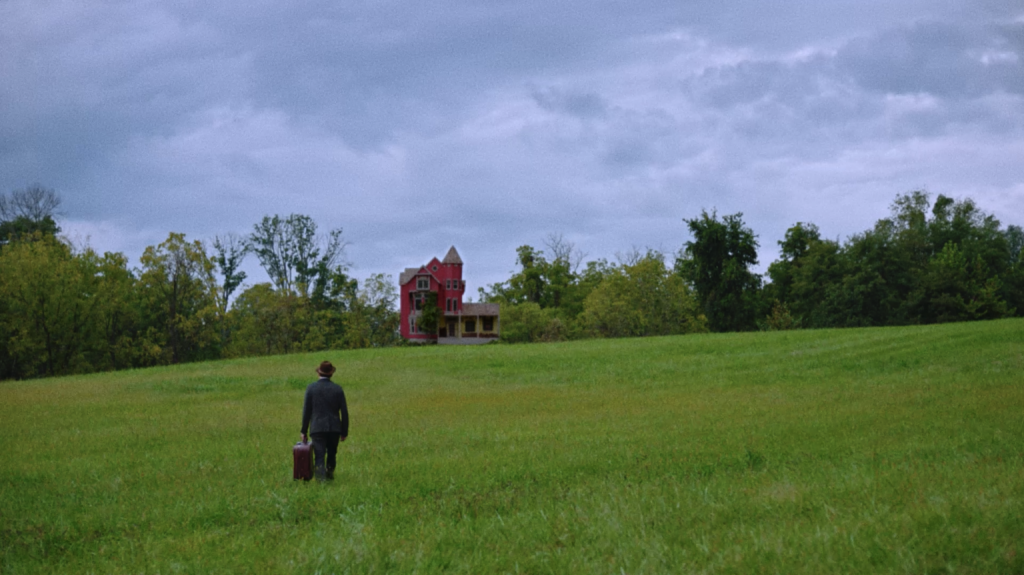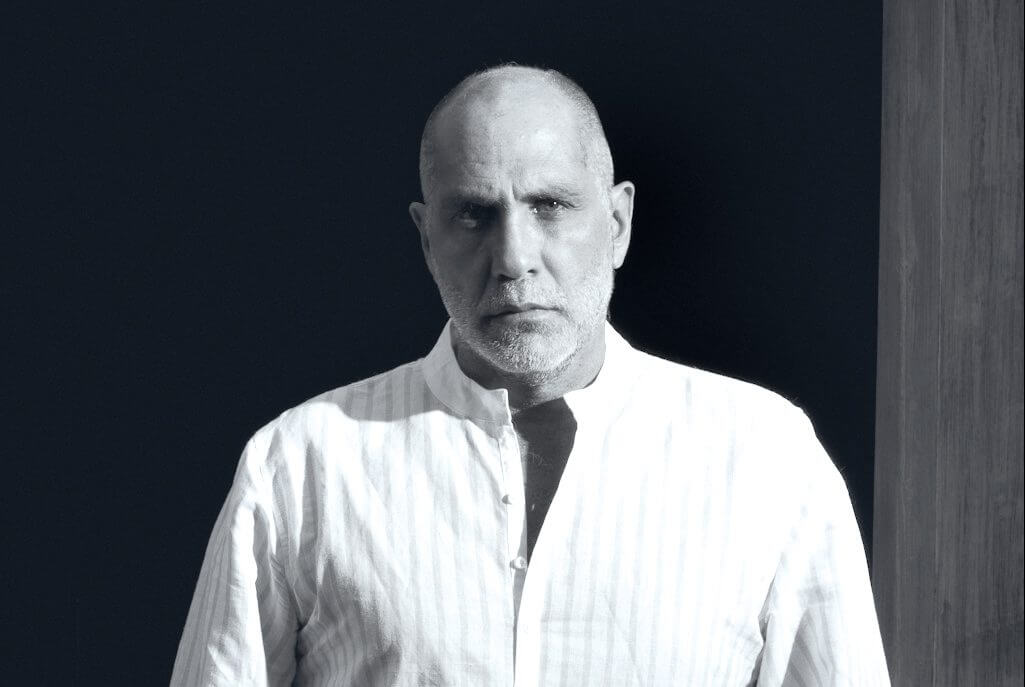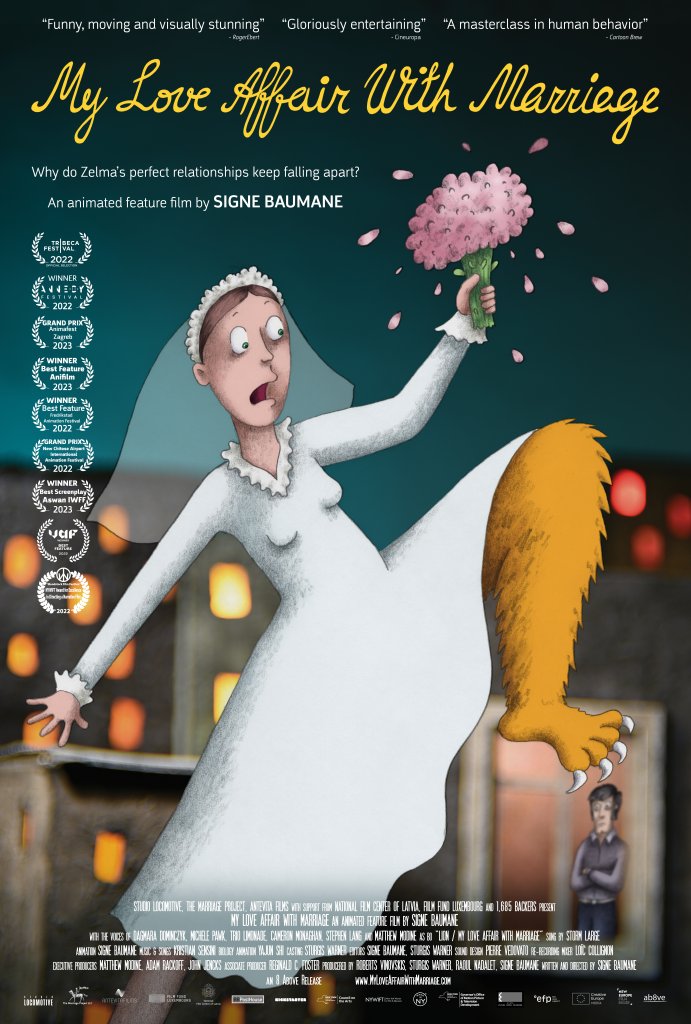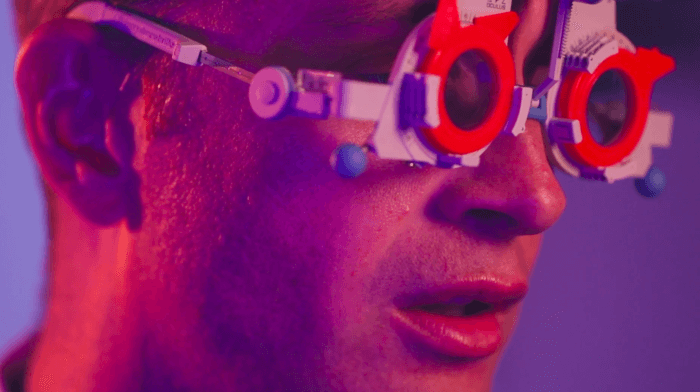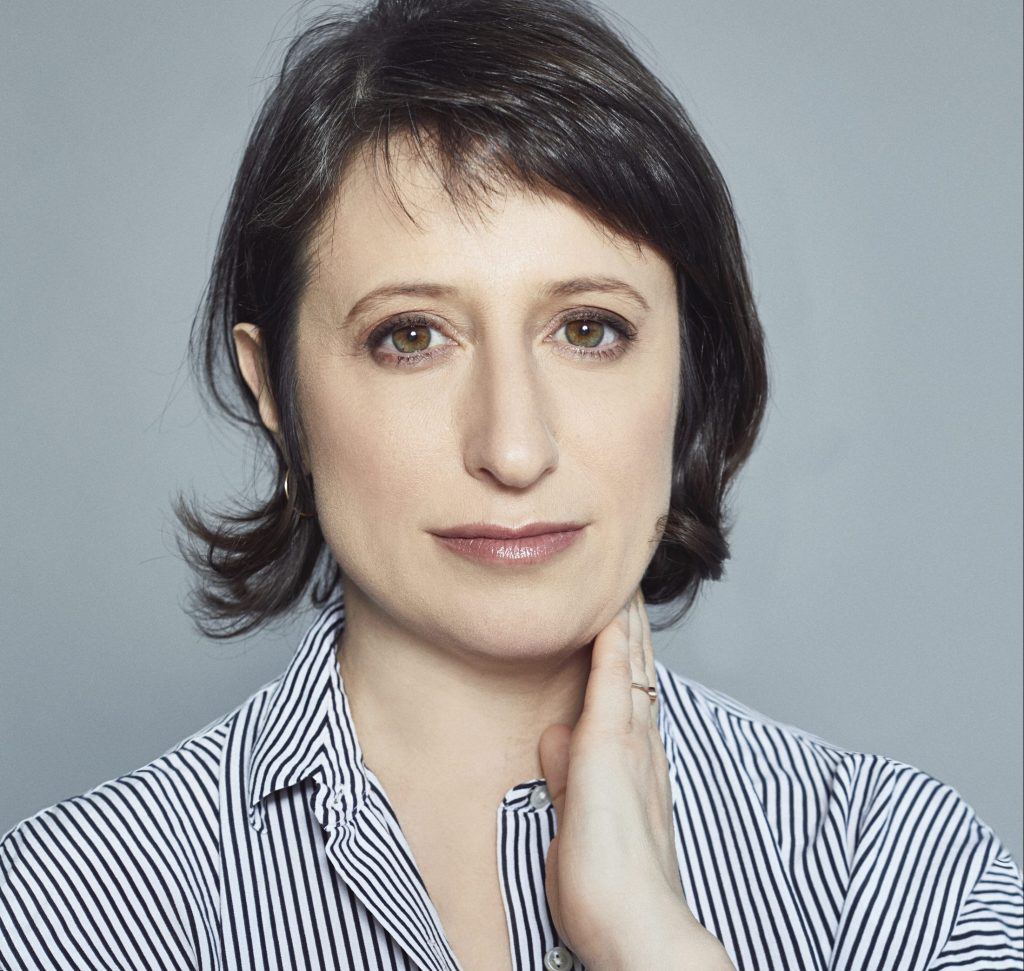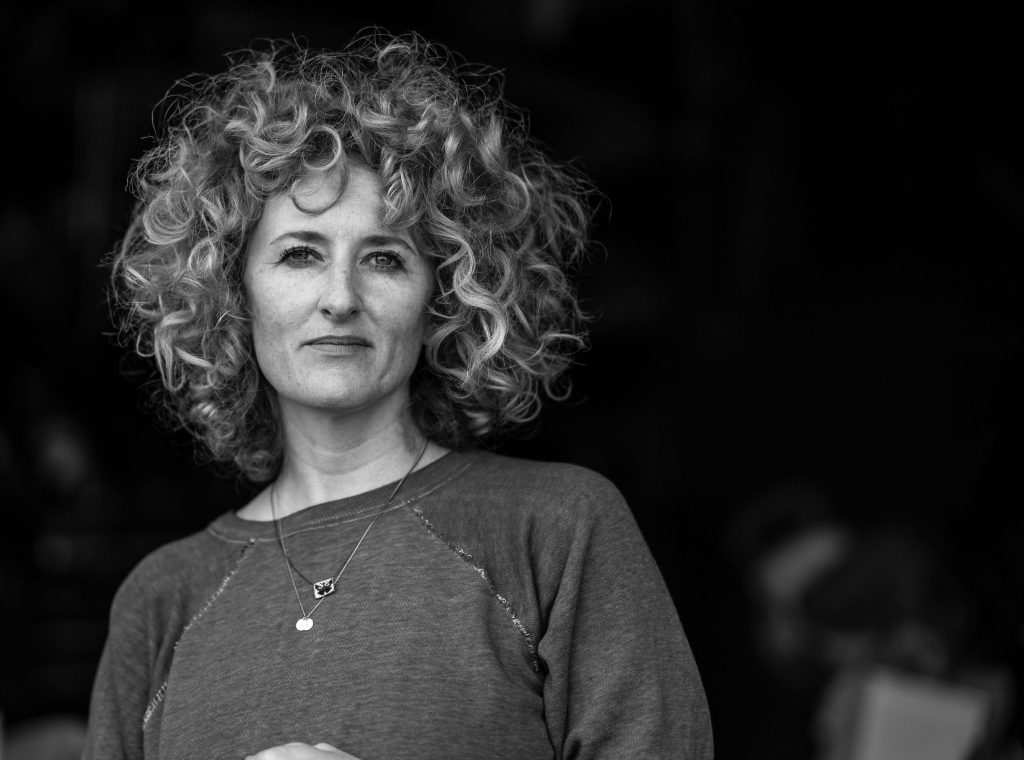Marjane Satrapi: The FRONTRUNNER Interview

She knew from a young age that good behavior and following social conventions are not her routes to success, which is why she went the other way, and turned her actions into art. Following her success with Persepolis (2007) and Chicken with Plums (2011) Oscar-nominated Iranian film director Marjane Satrapi is back with her new feature film, Radioactive,where she lets Rosamund Pike do the little “misbehaving”. The audience discovers a new face in the epical and unconventional scientist, Marie Curie, and her story of love, work, and death.
FRONTRUNNER sat down with Satrapi to discuss her new film, why we need education and culture to be key ingredients in the industry (and also the world), and how not caring for every single opinion is the secret to turning dreams into reality.

Photo credit: Amazon Studios
Congratulations on Radioactive. Can you tell us about the story, the inspiration, your resources, and the research process?
I remember my agent talking about a film based on Marie Curie. I thought, “Why do another film about Marie Curie when there are already four?” It should only be told again if there’s a new point of view. The title of the film was Radioactive, and not “Marie Curie”. That was appealing. What’s radioactive? It was a biopic of Marie Curie and, at the same time, a biopic of radioactivity. The film also talks about what happened after the death of Marie Curie and the effects of her discovery. An epical story of an epical woman who did whatever she wanted. She was the kind of feminist who wasn’t a shouter or a nice Polish woman for the husband at home, but who did her thing and showed that everything is doable.
Jack Thorne (Wonder, National Treasure) wrote the story in a similar way to how I feel. He doesn’t represent people as superheroes where everything is perfect and they can never do anything wrong. Such people don’t exist. These are the traits people accept easily in men. They don’t behave well but they remain a genius. So what the fuck, for women, this is never acceptable. We always have to be kind, cute, and soft. I don’t know women who are actually kind, cute, and soft all [of] the time. What intrigued me was for most scientists, their love, work, and death stories are different subjects. In Marie Curie’s case, her love story, death, and discovery are all the same story. Also, we are talking about a real person and to know her you have her biography. But that’s the point of view of the biographer, and who was there to know what Marie Curie actually said? To understand her, I read her correspondences, letters, and diary and analyzed her writing. The way she wrote was important, for example, when she was given Pierre Curie’s chair at Sorbonne University and became the first female professor. In her diary she writes, “Some idiots, some imbeciles congratulated me”. She used the word “imbecile”. Using this word shows that you have a harsh language, you don’t care about social conventions and being applauded. I had this material and the moral responsibility to create this character. I had to cheat a little because it’s a film, not a documentary. The goal was to be extremely respectful and faithful to whom she was. I did lots of research about science and I reread about physics and chemistry. You cannot tell the story of science if you don’t know what you’re talking about. The spectators will know when you’re bullshitting them.
Rosamund Pike plays Marie Curie. What was the casting process like and was she always your first choice?
When you see Marie Curie, your first thought isn’t Rosamund Pike, but I didn’t want somebody who is an exact copy. I didn’t want to make a muppet of Madame Curie. Intelligent people can always pretend they’re stupid, but if you’re not very bright, you cannot pretend that you’re smart. For Marie Curie, the actress has to be intelligent because you can feel it, you can see the fire in the eyes. Rosamund is highly intelligent. When I met her, she had these grey eyes. I was looking at her and I could see that she knows what she wants, but the moment she smiles, the sunshine comes into the room. She warms you up, but she can burn you too. When we talked, her understanding of the character was the same. So after the meeting, it was she or nobody else.
Intelligence and achieving dreams seem essential to your work, so by uniting these themes with education, how do you think they affect the story? Both in Radioactive and in Persepolis, intelligence, education and dreams play the key part.
I come from Iran and I never had a problem with integrating into society. Why is that? First of all, because I grew up in an atheist family, I didn’t have all this religious bullshit, but I also understood culture. Culture helps people to connect. If we take that society is a building, the people in art are not the bricks of the building; it’s the doctors, the farmers, the workers, etc. The art people are the cement. They are the cement that holds these bricks together and if we don’t have the cement, the building collapses. We take out the culture of any society in the world it collapses. Culture doesn’t solve every problem, but having more knowledge is always better than having less. Ignorance is not a virtue. The more you know, the better you can interact with others. For example, I read a book by Sándor Márai when I came to Budapest. I was interested in what Hungarians write about. Throughout the shoot, I wanted to get a better understanding. I wanted them to be my friends. The moment we understand the other person, chances that people will make war is less because it’s just another human being in front of you. The brain is something that we have to work with.
The brain takes you places.
It gives you the freedom to go anywhere and to have interaction with anyone. We don’t have this barrier, because you understand references and it adds to your point of view. We read the literature of another country about the same subject and people have another point of view.
Marie Curie was a genius, but she was looked down for it, whereas her husband was rewarded. The contrast is apparent in the film. How did you approach the unequal appreciation of one’s talent? Was this contrast something you wanted to use to tell younger girls to go after their dreams?
To tell you the truth, I love Pierre Curie, because he is very modern, even more modern than Marie Curie. We are at the end of the 19th century, he wants this woman to be his equal and to create science with her. He fought for her to be nominated for the Nobel Prize. Even in 2020, we don’t have men like him. He was very supportive and mild-mannered, whereas she wasn’t. They were in equilibrium. She was fire and fury and he was calmer. He was a great physicist and she a great chemist. It was a collaboration.
When it comes to girls, in France, fewer people study science today than in 1980. My mother’s generation went to university in the 70s to be emancipated. Girls today go to university to have a better marriage. Girls need to have self-confidence, it’s not that they are not good, but if they are told, they can’t do it, they end up not doing it. They need to have role models to show it’s possible. I read in a study that girls under the age of seven can associate the word genius with themselves. From that age, it’s something only for boys. They don’t believe they can be geniuses. This is why it’s important for the girls, but also for boys to understand that if they think Pierre Curie is cool, then so is having a girlfriend who is equal to them. We need to reinvent role models. Unfortunately, we think that we are advancing. We are not. For example in the US, abortion centers are closing one after the other. That’s not a good sign for women. They don’t have control of their body anymore. Society constantly repeats to women, that they need to be beautiful and have nice butts. Nobody talks about being loyal, respectful, and intelligent.
I have noticed that Marie Curie was not someone who cared for others’ opinions. I feel like even today, people, but mainly women pay too much attention to what others think.
It’s mathematical. As human beings do we like everyone? Of course not. So why is it that everybody has to like us? Mathematically it’s not possible. No matter what we do some will have to say something about us. One day I asked myself the question, “Do I like everyone? I don’t, so why am I expecting everybody to like me. They don’t like me. Fuck them.” Marie Curie was born like that she doesn’t care at all. I love that.
It’s just not part of her life.
Exactly. She is unapologetic and always herself. The people who don’t ask to be loved are always more attractive than the people who are starving for it.

Radioactive (2019)
Dir. Marjane Satrapi
Photo credit: Amazon Studios
You mentioned before that there are more films with male protagonists than female. Many female characters are daughters, wives, lovers, etc. Often there’re strong characters in scripts initially without gender. How could these characters just simply become female characters and not just because the script needs diversity? How do you think there could be equality in role distribution?
Half the population is women, so half of the stories should be about women. We have 5,000 years of patriarchy that’s embraced by men and many women too. Patriarchy doesn’t only belong to men. It’s a culture that is shared. 5,000 years of history won’t blow away in one go. At the Academy Awards let’s say, if we have 100 films, 10 made by women and 90 by men and we have 10 nominations, we will have 1 woman and 9 men. If they made 10% of the film, they will have 10% of the nominations. They cannot make 10% of the film and have 50% of the nominations. We have to ask ourselves why don’t we have more female directors?
It’s a question of trust and a question of budget. They will not trust a woman to give them a film with a certain budget because they think we are irresponsible which is completely stupid. It’s the whole culture that we must change. Changing culture through education. If we don’t change education, such things happen when actresses go to the Golden Globe Awards dressed in black. The question is not getting dressed in black: you can be naked, in flashy colors, but if you are strong and fierce, that’s it. These changes shouldn’t be superficial. The changes should be deep and for that, we have to believe in ourselves. I made comic books and animation and I’ve always worked with men. I was the only girl. Was it difficult? No. They were my friends. I never thought that as a girl I make comics differently from the boys. It’s just a question of sensitivity. It’s the belief that we have in ourselves. Sometimes people think that women are minor human beings, but mothers have raised these men too and they have to teach their sons not to think of women like that. However not all men are bad and predators and not all women are victims. We have good and bad people. We have to put humans in the center of attention to not care about the color, the religion, the face, etc. and then maybe we can achieve something.
That’s why Marie Curie is a role model because she was busy with discovery. She was an expat who had to the work twice as hard to have her voice heard, yet she wasn’t thinking about that.
By showing them you can do it you make them shut up. That’s what I like about her and I think this is a portrait of a very modern woman. She wasn’t looking for applause. Yes, she wasn’t the best mother in the world, but you cannot have 2 Nobel Prizes by cooking Gulyás all day.
Do you have a role model or someone you look up to?
My mother raised me to look up to Marie Curie and Simone de Beauvoir. She told me to be independent and to have a life for myself. I wasn’t raised up to be this beautiful girl and that the goal of my life would be to have a husband. No well-behaved woman ever achieved anything in her life. You have to misbehave a little as long as you don’t hurt anyone.
What are you currently working on?
I’m preparing for my next painting exhibition in October. I’m also writing a script with a friend…and let’s see what else happens.
Radioactive is available on Amazon Prime Video from the 24th of July 2020.

